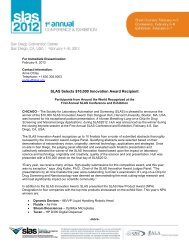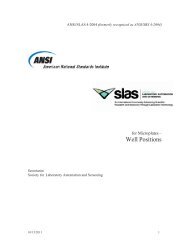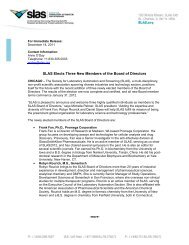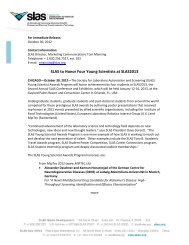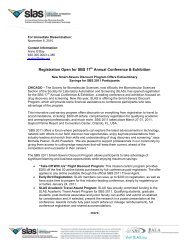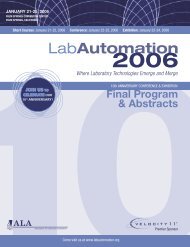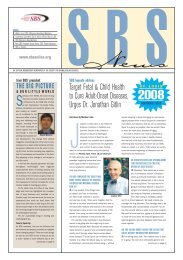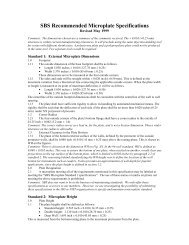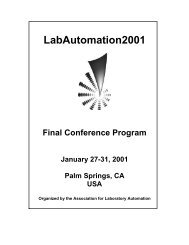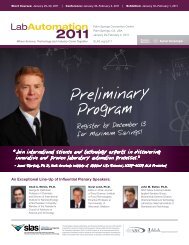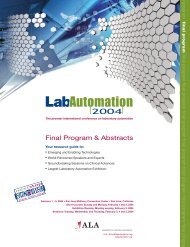omation mbers - Society for Laboratory Automation and Screening
omation mbers - Society for Laboratory Automation and Screening
omation mbers - Society for Laboratory Automation and Screening
Create successful ePaper yourself
Turn your PDF publications into a flip-book with our unique Google optimized e-Paper software.
12:00 pm Wednesday, February 4 Genomics – SNPs Room A1<br />
Tom Willis<br />
ParAllele BioScience, Inc.<br />
384 Oyster Point Boulevard Suite 8<br />
South San Francisco, Cali<strong>for</strong>nia 94080<br />
tom@p-gene.com<br />
101<br />
Co-Author(s)<br />
Malek Faham, Paul Hardenbol,<br />
Maneesh Jain, Eugeni Namsaraev,<br />
George Karlin-Neumann, Hosssein Fakhrai Rad,<br />
Mostafa Ronaghi, Ronald W. Davis<br />
Comprehensive Genetic Analysis Using Highly Multiplexed SNP Discovery <strong>and</strong> Genotyping<br />
The elucidation of complex genetic traits increasingly necessitates comprehensive genetic analysis.<br />
Comprehensive coverage of the human genome is required in order to unlock the potential of association studies.<br />
At the same time allelic heterogeneity will necessitate comprehensive discovery of alleles within genes in order to<br />
capture the contribution of collections of rare alleles to the phenotype (e.g., BRCA mutations <strong>for</strong> breast cancer).<br />
New technologies are needed to address these fundamental challenges to human genetics. ParAllele BioScience<br />
has developed a set of technologies that enable such comprehensive coverage by providing a flexible plat<strong>for</strong>m<br />
that enables tens of thous<strong>and</strong>s of interrogations to occur within a single tube reaction. The authors have used<br />
the concept of Molecular Inversion Probes (MIP) to build a SNP scoring technology that allows allele specific<br />
amplification of oligo probes through a process of self inversion. These molecular inversion probes can be<br />
multiplexed to the level of over 10,000 SNP calls per assay. Whole genome analysis is being enabled by this<br />
technology. In order to capture the important in<strong>for</strong>mation from rare alleles <strong>and</strong> private mutation, a high throughput<br />
variation scanning technology has also been developed. This technology exploits the exquisite sensitivity of<br />
bacterial DNA repair to produce a multiplexed assay that allows thous<strong>and</strong>s of DNA fragments to be sorted into<br />
those that contain mutations <strong>and</strong> those that do not. This technique, called Mismatch Repair Detection (MRD),<br />
allows comprehensive SNP discovery in patient populations. We have built a comprehensive genome analysis<br />
plat<strong>for</strong>m around these concepts by incorporating a molecular tagging strategy to allow robust detection of<br />
thous<strong>and</strong>s of allele specific amplicons using a robust, generic chip plat<strong>for</strong>m. We believe that this technology will<br />
bring comprehensive association studies within reach by greatly reducing the cost <strong>and</strong> sample requirements of<br />
SNP discovery <strong>and</strong> genotyping. Multiplexed genotyping <strong>and</strong> SNP discovery results are discussed <strong>and</strong> per<strong>for</strong>mance<br />
metrics presented.<br />
3:30 pm Wednesday, February 4 Genomics – In<strong>for</strong>matics Room A1<br />
Terrence Smallmon<br />
LabVantage Solutions<br />
2355 Menard Street<br />
St. Louis, Missouri 63104<br />
tsmallmon@labvantage.com<br />
The Benefits of a <strong>Laboratory</strong> In<strong>for</strong>mation Management System (LIMS) in Genomics<br />
A genomic LIMS must streamline the data flow beyond the four walls of the laboratory. By centralizing all<br />
in<strong>for</strong>mation about a sample, <strong>and</strong> relating it to other scientific in<strong>for</strong>mation, scientists can improve productivity as<br />
well as the quality of in<strong>for</strong>mation. The key benefits of a Genomics LIMS are:<br />
• Provides complete traceability of every sample.<br />
• Can acquire, integrate <strong>and</strong> manage multiple sources of dynamic <strong>and</strong> static data across the enterprise.<br />
• Reduces the amount of clerical work done by highly trained professionals – allows scientists to do more science.<br />
• Provides seamless integration with public/private databases.<br />
• Integrates with the solutions of your choice <strong>for</strong> scientific data interpretation <strong>and</strong> analysis.<br />
• Supports 21 CFR Part 11 Compliance.<br />
• Increases communication throughout the organization.<br />
• Reduces the number of times data is transcribed, increasing the integrity of the data.<br />
• Eliminates the need <strong>for</strong> human interaction with automatic features to generate routine reports.<br />
We now know as scientists exp<strong>and</strong> the world’s underst<strong>and</strong>ing of complex biological systems, the volume of<br />
analytical data will continue to rise. This talk will discuss how the Genomics LIMS allows the researcher to manage<br />
this data <strong>and</strong> optimize their discovery process.<br />
PODIUM ABSTRACTS




